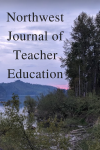Volume 13, Issue 1 (2018) Joyous Work: Improving Practice & Recharging Ourselves
Teachers have a funny sense of year --our year doesn't start and end with the calendar. Instead, we look toward the "start of the year" in August and the end of the year in June. This gift of shifted time allows educators a natural place to stop and reflect, to think back across the year to consider what went well and what can be changed moving forward; within that reflection time, we also recharge and prepare to work our hardest once again when the fall comes back around.
Canadian musician Gregory Hoskins' term joyous work comes to mind when I think of teaching: It can be both bruising and beautiful; educators can be both fragile and strong. But it is the joyous part that keeps us returning each year to work hard once again.
In this issue, we celebrate a year of learning, the reflections back over the learning we have had, and remind ourselves about taking much-needed time to recharge. It has been joyous work, indeed, reading the offerings from teachers and teacher educators from across the Pacific Northwest. The issue begins with two pieces focused on educator collaboration to deepen learning--both teacher and student. Sean Agriss' project connected educators at the university, community college and high school levels to develop common understandings to support their collective students. Susan Lenski, Nicole Rigelman, Anita Bright, Gayle Thieman, and Bernd Ferner share their research around lesson study, a method they used to learn more about their own instructional practices in a way that mirrored the expectations they had for their own teacher candidates. Next, Deanna Chappell Belcher shares her work with the Inside-Out Prison Exchange Program--which fostered truly reflective learning for her students, both those who were incarcerated and those who were not. Of course, as an instructor, her learning was also deeply impacted as part of the interactions. Krista James shares her analysis of how the Alaska Cultural Standards can be used in conjunction with principles of Universal Design for Learning in supporting an emancipatory education for Indigenous Alaskan students. New teacher Bailey Ellis-Wiard shares a reflective essay about how she holds onto her beliefs within a larger educational system that, at times, can feel constrictive. Lina Darwich shares powerful ways that she supports her own renewal while also building in time for renewal for her teacher candidates, reminding teachers at the very cusp of their career that caring for self is an important part of career maintenance. And, Kimberly Campbell takes us forward into next year with ideas for reinventing Back-to-School Night, including how her teacher candidates have brought their personalities to a traditionally impersonal event in new and invigorating ways.
We hope this issue inspires you to reflect on your teaching year, consider ways you can rejuvenate this summer, and rebuild an excitement for another year of truly joyous work.
Articles
Reinvigorating Classroom Practice through Collaborative K-12 and Higher Education Professional Development
Sean W. Agriss, Katie O'Connor, LouAnn Reamer, and Andrea Reid
What Teacher Educators Learned about Negotiating Power Relationships During Lesson Study Planning
Susan J. Lenski, Nicole R. Rigelman, Anita L. Bright, Gayle Thieman, and Bernd R. Ferner
Fresh Starts Behind Bars ... Teaching with the Inside-Out Prison Exchange Program
Deanna Chappell Belcher
Living Your Values in the Classroom: The Connection Between Beliefs, Pedagogy, and Personhood
Bailey Ellis-Wiard
Back-to-School Night: The Focus Could Be Love
Kimberly H. Campbell

Call For Manuscripts.
As educators, we all have readings that are cornerstone texts for us, that we return to for inspiration in tough times or we revisit when we need reminders about our work. Recently I revisited Thomas Newkirk’s 2009 text, Holding on to Good Ideas in a Time of Bad Ones: Six Literacy Principles Worth Fighting For. I was not looking back to refresh my memory of literacy strategies as much as I was looking back for my “grounding”. I have been very fortunate to have strong mentors in my teaching career, people who have pushed me to build a belief system and make decisions about teaching that keep me grounded within those beliefs. Beliefs such as all kids can learn and kids need choice in what they read and write—those sorts of ideas. In the field of literacy, this has been important as policies come and go. But lately in my work as a teacher educator, I have felt ungrounded, which is what took me back to Newkirk to help me think about how the decisions in my work are made and how they are (or aren’t) connected with my foundational beliefs.
In the next issue of NWJTE, we welcome submissions on a variety of topics related to teaching and teacher education. The editors would like to encourage thought on practice that is continuously checked against a belief-system. We encourage authors to consider: How do we tie our decisions back to our vision of providing every child with equitable access to an emancipatory education? How do we make decisions that hold pre-K - 12 learners in the forefront of our thinking? How do we make sure we are not blowing with the winds of the next educational trend but instead hold onto those values that support all learners? In addition, we invite authors to consider: What are the current issues in your community? How are teachers working to engage with those issues? How can professionals who prepare teachers support engagement with the issues in the communities where we live and work? What are the implications for the children in the schools where the teachers we prepare teach? And, how do our beliefs support our continued work with teachers and the communities we serve?
Submission deadline: February 15, 2019 for spring publication.

